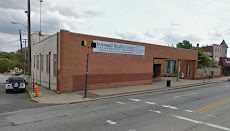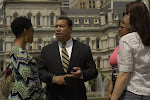BALTIMORE, MD (December 9, 2013) — Mayor Stephanie
Rawlings-Blake and Baltimore City Health Commissioner Oxiris Barbot, M.D. today
announced the start of Baltimore City’s Code Blue program for this coming
winter. Code Blue is a multi-agency coordinated approach to providing
vulnerable populations in Baltimore City with relief from extreme cold weather.
The program’s goal is to reduce the number of hypothermia deaths and related
illnesses in the City.
The greatest risk of illness and deaths due to cold weather
is from December to February, with the risk peaking in January, typically the
coldest winter month.
“While last winter was milder than some in recent memory,
this past weekend brought our first storm of the season and we can anticipate
that more severe and colder weather is not far behind,” said Mayor
Rawlings-Blake. “It is critical that we get the word out now about resources
available for those who need food and a warm place to go to ensure that all
Baltimore City residents are safe from the cold.”
“Thankfully the first snow of the season didn’t bring frigid
temperatures, but as the winter season progresses, temperatures will drop in
the near future,” said Dr. Barbot. “We will be actively monitoring weather
changes and remind people to stay indoors in safely heated areas to minimize
the risk of hypothermia. If individuals must go outside in the cold, we urge
them to dress warmly and stay as dry as possible. For those experiencing
homelessness, we encourage them to take advantage of shelter resources that
will be provided.”
Through March 2014, the Health Commissioner will declare a
Code Blue alert based on the following criteria:
• When temperatures, including wind chill, are expected to
be 13˚F or below. This threshold can be reached by having a temperature at or
below 20˚F with 5 mph sustained winds or a temperature at or below 25˚F with 15
mph sustained winds.
• When other conditions (i.e. strong winds, forecasted
precipitation for more than two hours, extended period of cold, sudden cold after
a warm period) are deemed by the Health Commissioner to be severe enough to
present a substantial threat to the life or health of vulnerable Baltimore
citizens.
Code Blue indicates an increased risk for cold injuries or
even death for those exposed to low temperatures. Once a Code Blue declaration
is made, public messaging activities are undertaken to encourage safety when
outdoors and response partners such as the Mayor’s Office of Human Services -
Homeless Services work to ensure those in need find sheltering.
During a Code Blue, the Mayor’s Office of Human Services
(
http://humanservices.baltimorecity.gov/) will operate a 24-hour Housing &
Resource Center for men and women at 620 Fallsway with 60 beds available for
residents seeking meals and sleeping quarters. Private homeless shelters will
be encouraged to extend their hours and keep people indoors.
In the winter of 2012-2013, there were 10 Code Blue days
declared by the Health Commissioner and five deaths in Baltimore City. The
prior winter (2011-2012) there were 11 Code Blue days and three
hypothermia-related deaths.
Based on historical data from Baltimore and data from the
Centers for Disease Control (CDC), the vulnerable populations targeted by this
plan include:
- Street dwellers and the homeless
- Individuals abusing drugs (heroin/methadone), alcohol, or
other substances
- Economically disadvantaged and without home heating
- Elderly persons and young children
- Individuals suffering from pre-existing heart conditions and
diabetes
- Individuals with mental health problems
Cold Weather Tips for
Staying Healthy:
- Wear multiple layers of loose-fitting clothing.
- Always wear a head covering, like a hat and/or scarf, when
outdoors.
- Keep space heaters and candles away from flammable
materials, such as curtains, furniture and loose clothing.
- Drink plenty of fluids and avoid alcoholic beverages.
- Check on those who are elderly and/or chronically ill.
- Provide appropriate shelter for domestic animals.
- Heart patients are advised against physical exertion in
colder temperatures.
- Protect yourself against falls in icy or snowy conditions
Extreme cold weather presents risks in addition to
hypothermia as residents use prohibited alternative heat or power sources, such
as a stoves and generators that may cause fire or carbon monoxide poisoning.
Residents are encouraged to contact 311 if a neighbor is without heat or power
so that city agencies can assist them. Energy assistance may be available to
those who need it. For more information, individuals may contact the Office of
Home Energy Programs at 410-396-5555.
Additional cold-weather resources for the public and a
listing of city and private shelters, is available on the Health Department’s
Code Blue website at
http://www.baltimorehealth.org/codeblueinfo2.html. For
other cold-related inquiries and service requests, or to find a nearby homeless
shelter, residents can call 311 (410-396-3100 after hours).









No comments:
Post a Comment